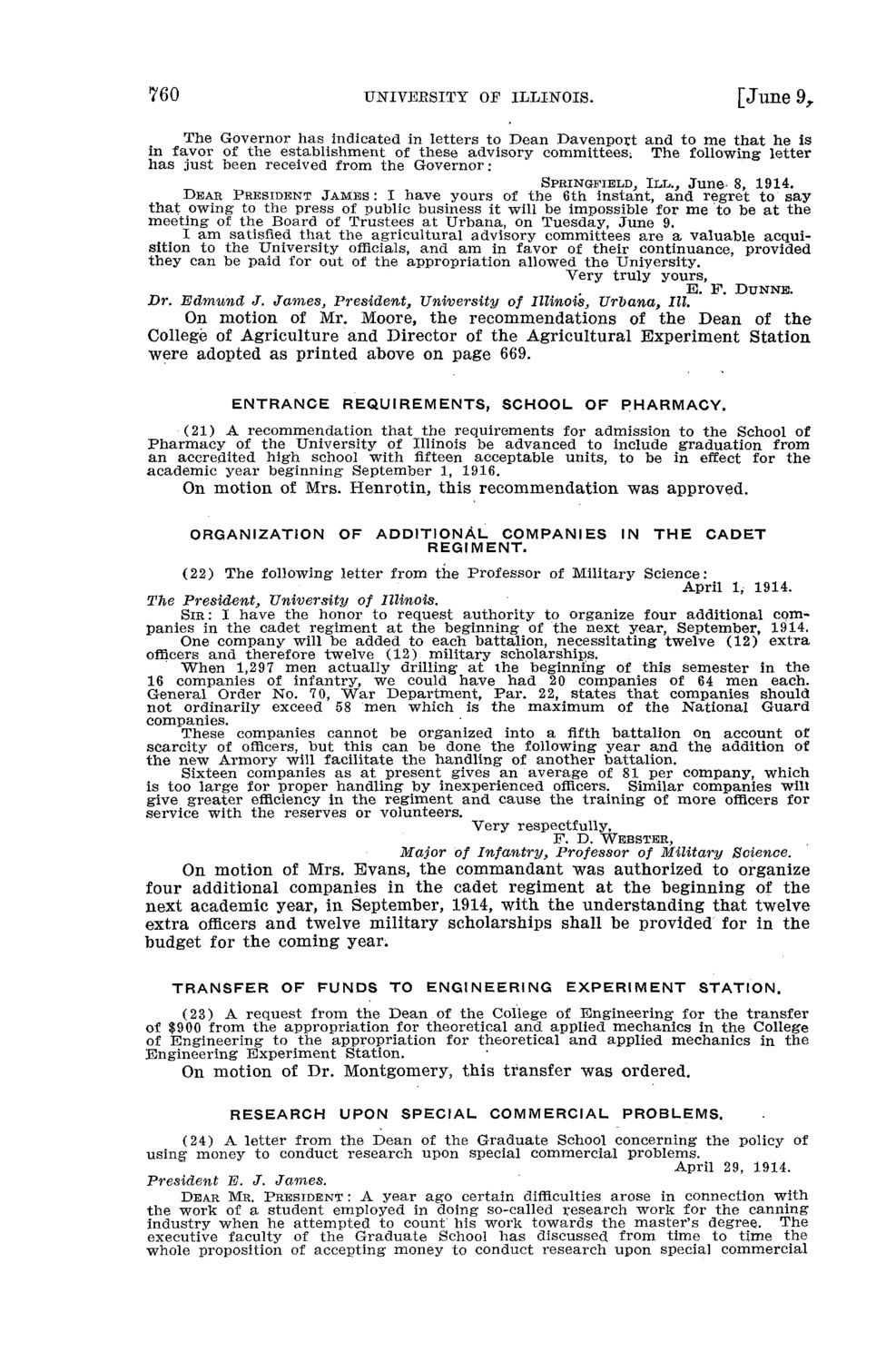Caption: Board of Trustees Minutes - 1914
This is a reduced-resolution page image for fast online browsing.

EXTRACTED TEXT FROM PAGE:
760 UNIVEESITY OF ILLINOIS. [June 9^ The Governor has indicated in letters to Dean Davenport and to me that he is in favor of the establishment of these advisory committees; The following letter has just been received from the Governor: that owing to the press of public business it will be impossible for me to be a t the meeting of the Board of Trustees at Urbana, on Tuesday, June 9. I am satisfied that the agricultural advisory committees are a valuable acquisition to the University officials, and am in favor of their continuance, provided they can be paid for out of the appropriation allowed the University. Very truly yours, Dr. Edmund J. James, President, University of Illinois, Urbana, III. E. F . DUNNE. SPRINGFIELD, I K U , June- 8, 1914. DEAR PRESIDENT JAMES : I have yours of the 6th instant, and regret to say On motion of Mr. Moore, the recommendations of the Dean of t h e College of Agriculture and Director of the Agricultural Experiment Station were adopted as printed above on page 669. E N T R A N C E REQUIREMENTS, SCHOOL OF P H A R M A C Y . (21) A recommendation that the requirements for admission to the School of Pharmacy of the University of Illinois be advanced to include graduation from an accredited high school with fifteen acceptable units, to be in effect for the academic year beginning September 1, 1916. On motion of Mrs. Henrotin, this recommendation was approved. ORGANIZATION OF A D D I T I O N A L C O M P A N I E S REGIMENT. IN T H E CADET (22) The following letter from the Professor of Military Science: April 1, 1914. The President, University of Illinois. SIR: I have the honor to request authority to organize four additional companies in the cadet regiment a t the beginning of the next year, September, 1914. One company will be added to each battalion, necessitating twelve (12) extra officers and therefore twelve (12) military scholarships. When 1,297 men actually drilling a t the beginning of this semester in the 16 companies of infantry, we could have had 20 companies of 64 men each. General Order No. 70, War Department, Par. 22, states that companies should not ordinarily exceed 58 men which is the maximum of the National Guard companies. These companies cannot be organized into a fifth battalion on account of scarcity of officers, but this can be done the following year and the addition of the new Armory will facilitate the handling of another battalion. Sixteen companies as at present gives an average of 81 per company, which is too large for proper handling by inexperienced officers. Similar companies will give greater efficiency in the regiment and cause the training of more officers for service with the reserves or volunteers. Very respectfully, Major of Infantry, F. D. WEBSTER, Professor of Military Science. On motion of Mrs. Evans, the commandant was authorized to organize four additional companies in the cadet regiment at the beginning of the next academic year, in September, 1914, with the understanding that twelve extra officers and twelve military scholarships shall be provided for in the budget for the coming year. TRANSFER OF F U N D S TO E N G I N E E R I N G EXPERIMENT STATION. (23) A request from the Dean of the College of Engineering for the transfer of $900 from the appropriation for theoretical and applied mechanics in the College of Engineering to the appropriation for theoretical and applied mechanics in the Engineering Experiment Station. On motion of Dr. Montgomery, this transfer was ordered. RESEARCH UPON S P E C I A L COMMERCIAL PROBLEMS. (24) A letter from the Dean Of the Graduate School concerning the policy of using money to conduct research upon special commercial problems. April 29, 1914. President B. J. James. DEAR MR. PRESIDENT : A year ago certain difficulties arose in connection with the work of a student employed in doing so-called research work for the canning industry when he attempted to count' his work towards the master's degree. The executive faculty of the Graduate School has discussed, from time to time the whole proposition of accepting money to conduct research upon special commercial
|